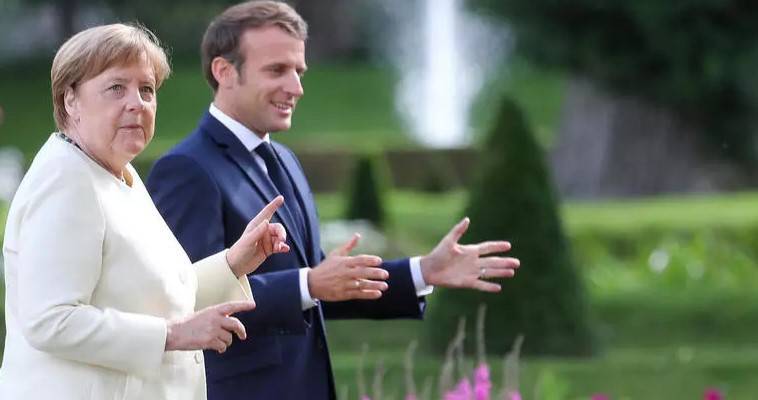Nefeli Lygerou: Macron and Merkel are looking for common ground, but the rift is widening
20/08/2020
Emmanuel Macron welcomes Angela Merkel today at the Breganson Tower, the official summer residence of the current President of France, located just outside Toulouse. This is the first time the chancellor has been invited to Breganson. The last German chancellor to visit the French summer presidential residence was Helmut Kohl, at the invitation of then-President François Mitterrand, in 1985. Macron hosted Russian President Vladimir Putin last August and Recep Tayyip Erdogan, when he was Prime Minister.
After the formal working meeting, they are expected to give a press conference. Their agenda includes European countries’ co-ordination of the Covid-19 pandemic, the EU’s multiannual budget since the July 21 agreement, Brexit, the climate crisis, trade and the Conference on the Future of Europe. .
At least that is what the Elysee said in a statement. “The two leaders will look at the situation in Lebanon, Belarus and the eastern Mediterranean,” the statement added, “as well as the EU ‘s relations with its major partners, such as China and Africa.”
France-Germany relations are at a sensitive stage. On the one hand, the factors augmenting their competition have been strengthened, due to different perspectives and interests, but on the other hand, they both consider it their duty to work together to solve problems that are on the EU agenda.
It is worth mentioning at this point that the relationship between the two leaders has a conflicting dimension. The chancellor, in an interview a few months earlier, had admitted that “there are differences in mentality.” The truth is that Macron began his presidency with the expectation that together with Merkel they would make significant changes to the EU architecture, in order to open new avenues for its development.
Berlin, however, took care to bury the French president’s proposals, although the chancellor, as usual, avoided rejecting them explicitly. Macron’s apparent frustration also determined their personal relationship, but to a large extent the Franco-German relationship as well. This has allowed real disagreements to emerge about the future of the EU, but also about Europe’s attitude towards third countries.
What separates Paris and Berlin
The Eastern Mediterranean is one of the issues that separates Paris and Berlin. Germany is essentially opposed to imposing sanctions on Turkey, which is why it is pushing Greece to engage in bilateral negotiations, essentially on Ankara’s unilateral expansionist claims. That is why Berlin was annoyed by the signing of the Greek-Egyptian pact for the partial demarcation of the EEZ. Germany believes that Athens with this move poured fuel on the fire.
In this atmosphere, moreover, Germany, but also the EU, two days after the signing of the pact, accepted the Turkish allegations of illegal turn-backs of migrants from Greece and since then has reiterated formally and neutrally that they are “against the escalation in the region and in favor of dialogue between the parties involved “.
It is obvious to the naked eye that Merkel is showing great leniency in the face of Erdogan’s provocations, presenting herself as a credible mediator who must have good relations with both sides. In fact, German diplomacy follows its traditional vista, which since the time of the Ottoman Empire have shown an eclectic affinity with the Turkish factor.
Instead, Macron sees Erdogan’s Turkey as a rival to hegemony in the Eastern Mediterranean following the partial withdrawal of Americans from the region. In fact, having against him an oriental leader who does not hesitate to use military force, as in Syria and Libya, he has given French foreign policy a dynamism that it did not have, while everything shows that the bombing of the Turkish base in Al Watiya, in west Libya, also had a French “aroma”.
Macron’s France, therefore, not only does not coordinate its choices with Germany in the Mediterranean, but also essentially deviates from them, to the extent that it cannot be excluded that it might bring the two major partners on a path of political conflict. Paris is reportedly determined to obstruct Erdogan’s neo-Ottoman plans, which Berlin views Turkey rather favorably. This deviation, in combination with others, is likely to divide the former Franco-German axis to a degree of division, if not rupture. This is because everyone will try in every way to tow the EU in their own direction.





